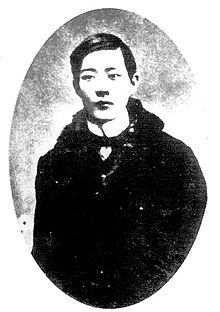Liu Shipei | |
|---|---|
 | |
| Born | 24 June 1884 |
| Died | 20 December 1919 (aged 35) Beijing, China |
| Nationality | Chinese |
| Other names | 申叔 Shenshu |
| Education | Traditional Chinese |
| Occupations |
|
| Spouse | He Zhen 何震 |
| Liu Shipei | |||||||||||
|---|---|---|---|---|---|---|---|---|---|---|---|
| Traditional Chinese | 劉師培 | ||||||||||
| Simplified Chinese | 刘师培 | ||||||||||
| |||||||||||
Liu Shipei (Chinese: 劉師培; 24 June 1884 – 20 December 1919) was a philologist, Chinese anarchist, and revolutionary activist. While he and his wife, He Zhen were in exile in Japan he became a fervent nationalist. He then saw the doctrines of anarchism as offering a path to social revolution while remaining intent on preserving China's cultural essence, especially Taoism and the records of China's pre-imperial history. In 1909 he unexpectedly returned to China to work for the Manchu Qing government and after 1911 supported Yuan Shikai's attempt to become emperor. After Yuan's death in 1916 he joined the faculty at Peking University. He died of tuberculosis in 1919.[1]
- ^ Boorman (1968), pp. 411–413.